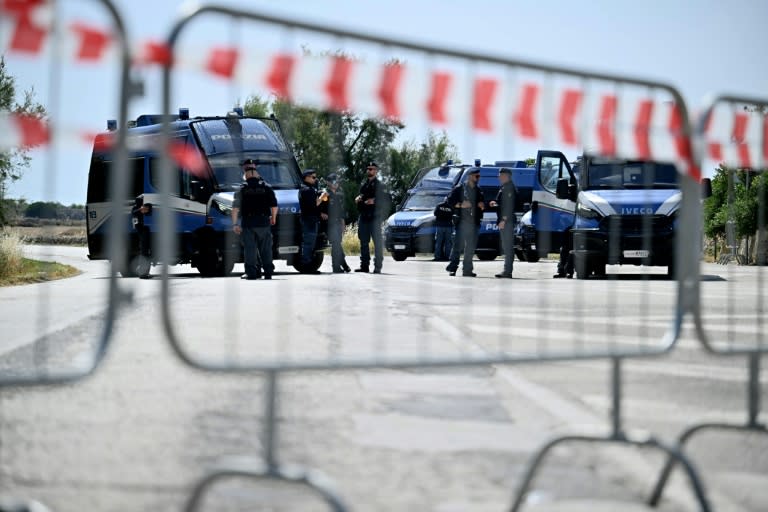G7 to agree $50-bn Ukraine loan at Italy summit

G7 leaders were set to agree at an Italy summit Thursday on a new $50-billion loan for Ukraine, using profits from frozen Russian assets.
Ukrainian President Volodymyr Zelensky flew in to join US President Joe Biden and leaders from Italy, Britain, France, Germany, Canada and Japan at a session of the Puglia talks dedicated to the war.
Top of the agenda is a plan for an urgent $50-billion loan to help Kyiv with defence, budgetary support and reconstruction after more than two years of war with Russia.
The loan would be secured against the future profits from interest on 300 billion euros ($325 billion) of Russian central bank assets frozen by Western allies.
"Good news from the G7: another $50 billion for Ukraine," German Finance Minister Christian Lindner wrote on X.
He said the agreement showed Russian President Vladimir Putin our "unity, greatly helps Ukraine and relieves the burden on budgets".
"Now we are working on the details."
French President Emmanuel Macron's office had on Wednesday said there was a deal on providing the money by the end of this year.
"We are on the verge of a good outcome here," US National Security Advisor Jake Sullivan said Thursday, while adding that the details still needed to be thrashed out.
- Common vision -
Zelensky had earlier said he was expecting "important decisions" at the summit.
He also said he would sign two more security agreements with Japan and the United States in Puglia.
The G7 countries -- which count the European Union as their unofficial eighth member -- have been Ukraine's key military and financial backers since Russia invaded in February 2022.
"Today the G7 in Bari will show unity. Unity for Ukraine's freedom," European Commission President Ursula von der Leyen wrote on X.
Zelensky, who was due to hold a joint press conference with Biden later Thursday, has been engaged in a flurry of diplomacy aimed at boosting international support.
He spoke earlier this week in Berlin at a reconstruction conference and is set to join more than 90 countries and organisations this weekend for a peace summit in Switzerland.
Sullivan said the G7 leaders were aiming for a "common vision" on using the frozen assets.
"We have the major tentpoles of this decided but some of the specifics will be left to be worked through by experts on a defined timetable," he told reporters.
The EU agreed earlier this year to use the profits from the frozen Russian assets for Ukraine, worth up to three billion euros a year.
But the idea at the G7 is to use this to provide more and faster help through a massive upfront loan.
The US this week also announced a raft of new sanctions aimed at constraining Moscow's war machine, while raising the stakes for foreign banks that still deal with Russia.
The UK later followed suit with its own new sanctions, including targeting Moscow's main stock exchange.
- Irreplaceable role -
The summit comes at a time of extraordinary global turmoil.
Apart from the conflict in Ukraine, the Hamas-Israel conflict is raging and economic tensions are rising between China and Western countries.
Many G7 countries are also in political flux. Everyone in Puglia is aware this could be Biden's last G7 summit if he loses to Donald Trump in November US elections.
Britain's Rishi Sunak is tipped to be ousted in July 4 elections, while France's Macron and Germany's Olaf Scholz are both under pressure after gains by the far right in EU elections last weekend.
By contrast, meeting host Giorgia Meloni, Italy's prime minister, is riding high after her far-right party topped European Parliament elections last weekend.
Meloni laughed and joked with her G7 counterparts as she welcomed them among the olive trees of the luxury Borgo Egnazia resort, and took a selfie with reporters.
But she had a serious message.
"The Group of Seven in recent decades has assumed an irreplaceable role in the management of global crises, especially those that jeopardise our freedom and our democracy," she told an opening session.
The talks began with short session on Africa, development and climate change, before turning to the Middle East.
The G7 leaders have already announced their support for a Gaza truce deal outlined by Biden, which would also see the release of hostages taken in Hamas's October 7 attack on Israel.
Another key issue in Puglia, to be discussed Friday, will be concerns about China's so-called "industrial overcapacity", particularly in green energy and technology sectors such as solar panels and electric vehicles.
Around a dozen non-G7 leaders have also been invited for talks on Friday, including Jordan's King Abdullah II, Turkish President Recep Tayyip Erdogan, UAE president Sheikh Mohamed bin Zayed, India's Narendra Modi and Pope Francis.
bur-ar/ide/yad


